人教版英语七年级上册 Unit 5 Do you have a soccer ball? Section A(1a-2d)课件(共55张PPT)
文档属性
| 名称 | 人教版英语七年级上册 Unit 5 Do you have a soccer ball? Section A(1a-2d)课件(共55张PPT) |
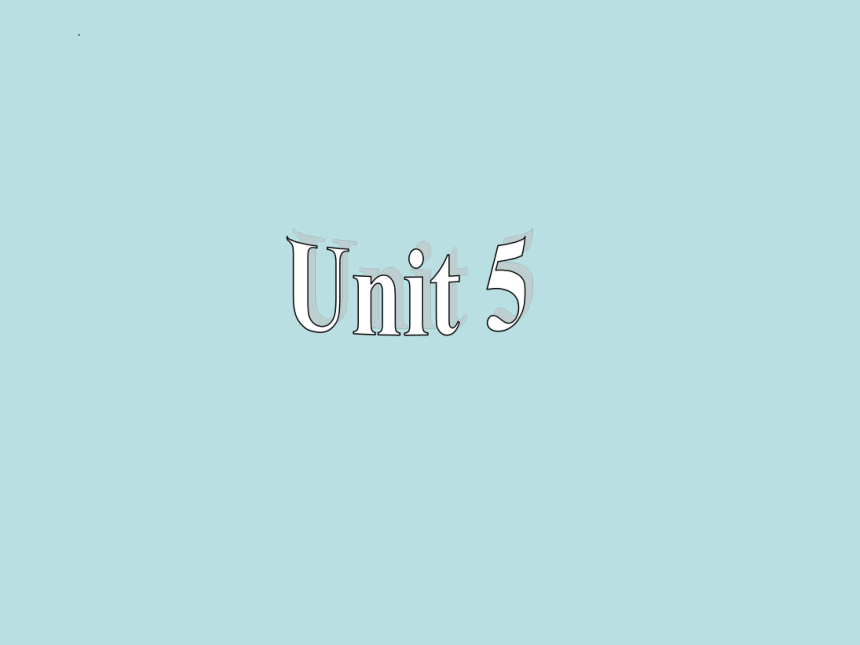
|
|
| 格式 | zip | ||
| 文件大小 | 3.7MB | ||
| 资源类型 | 教案 | ||
| 版本资源 | 人教新目标(Go for it)版 | ||
| 科目 | 英语 | ||
| 更新时间 | 2022-07-10 00:00:00 | ||
图片预览

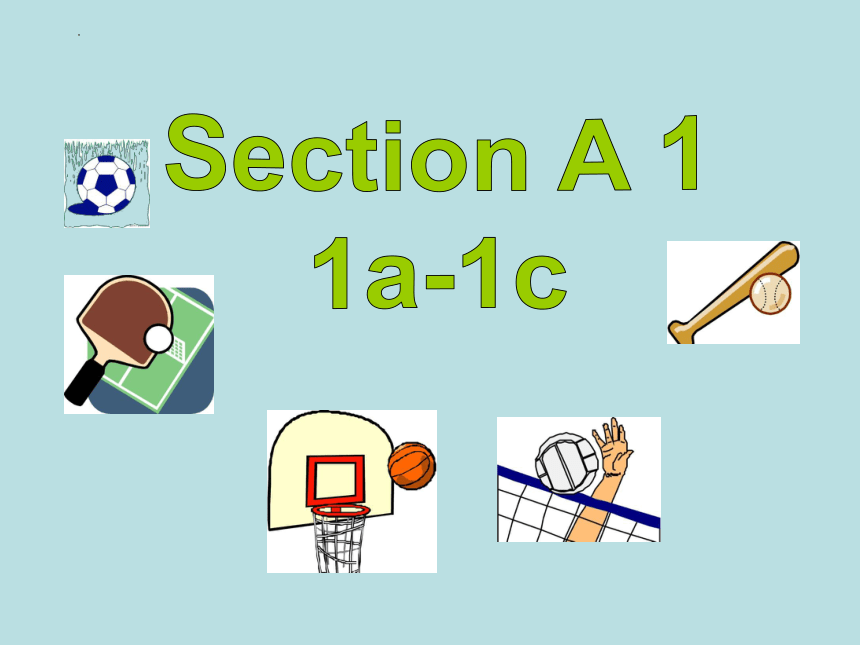
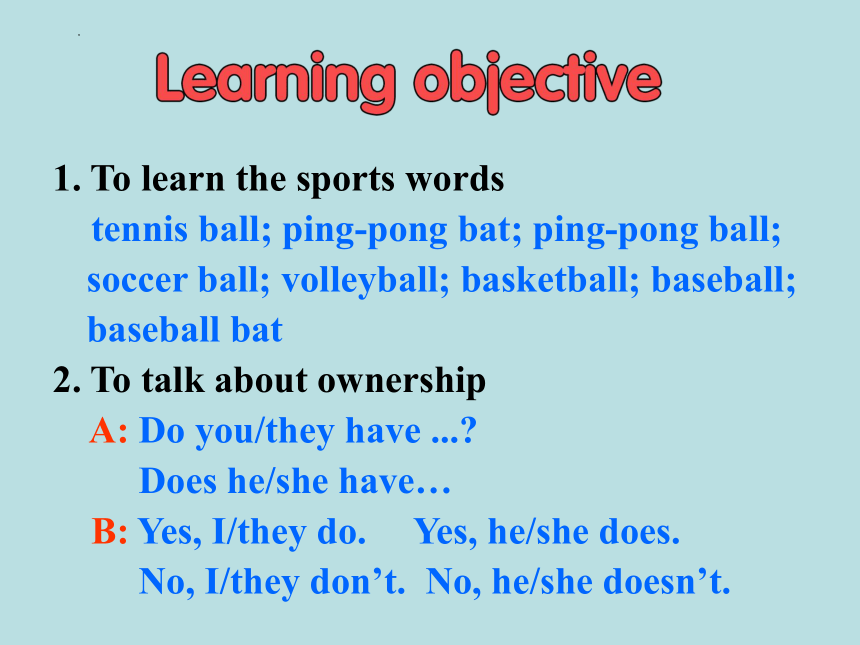
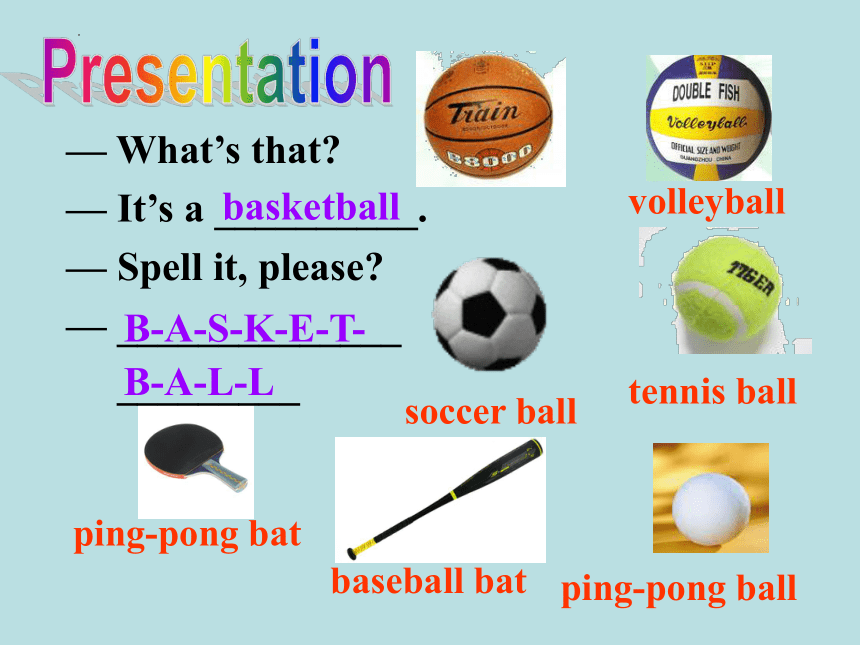
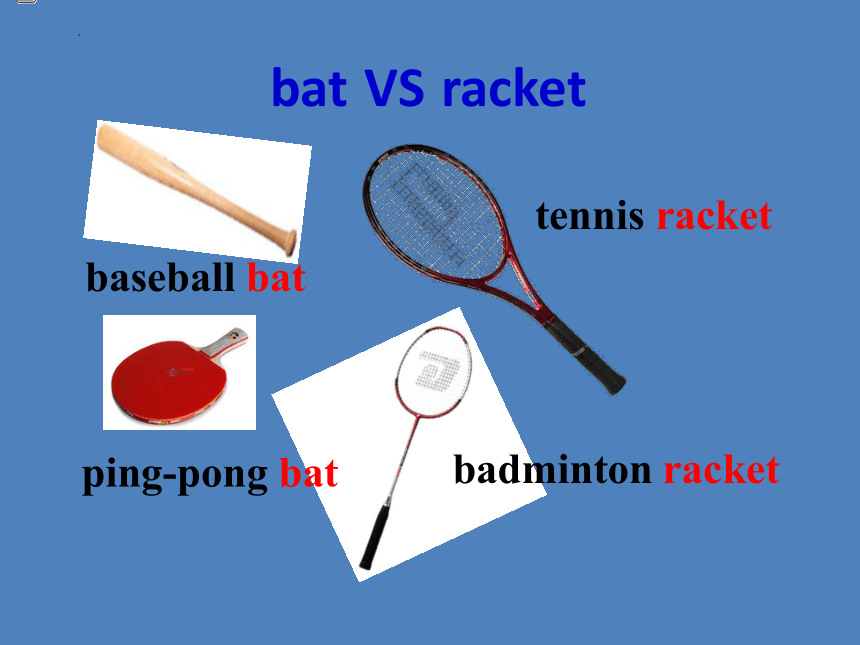
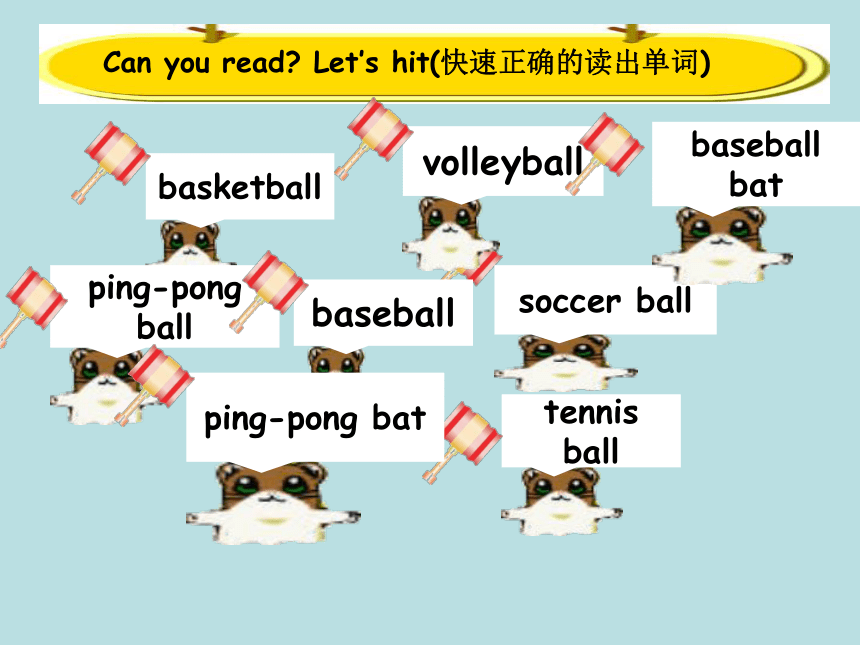
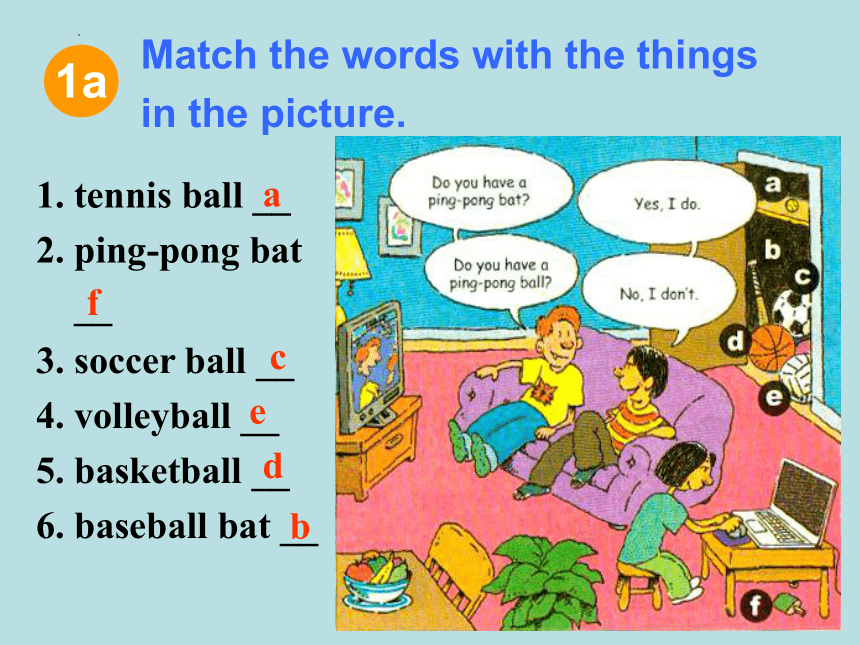
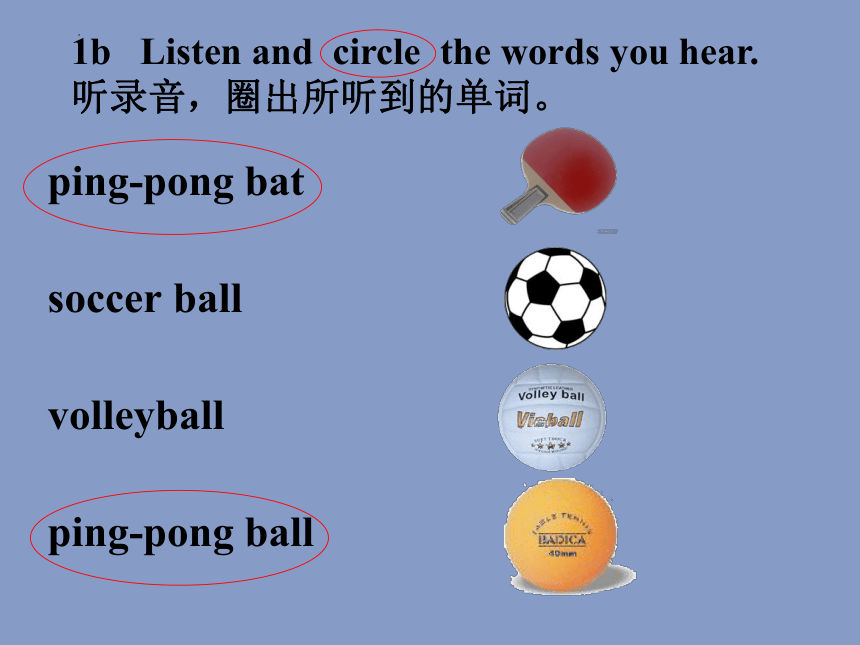
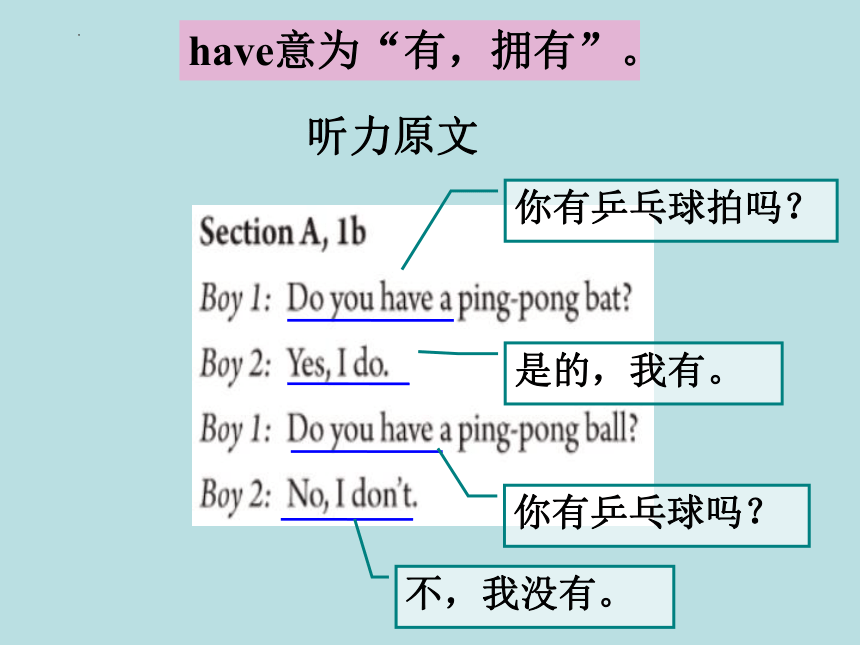
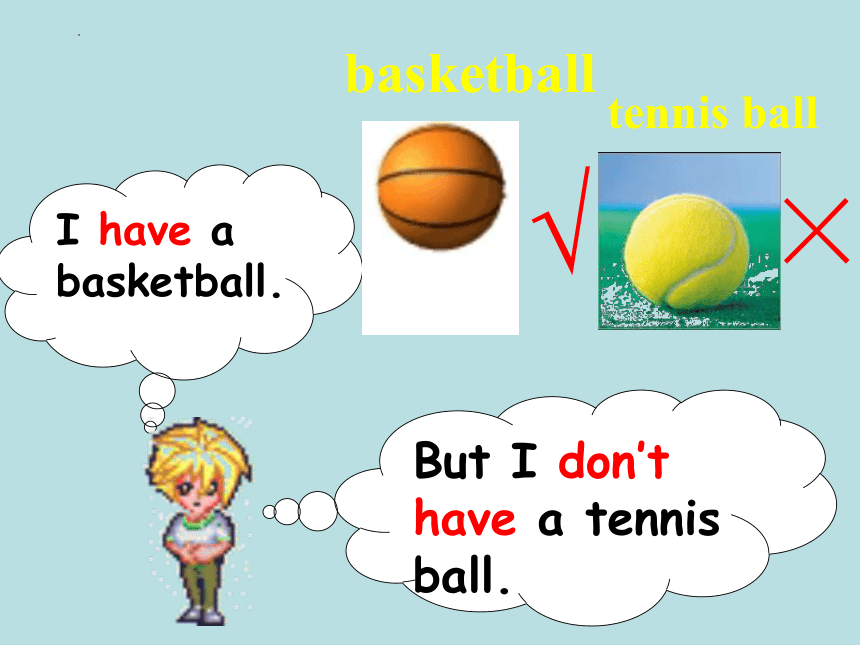
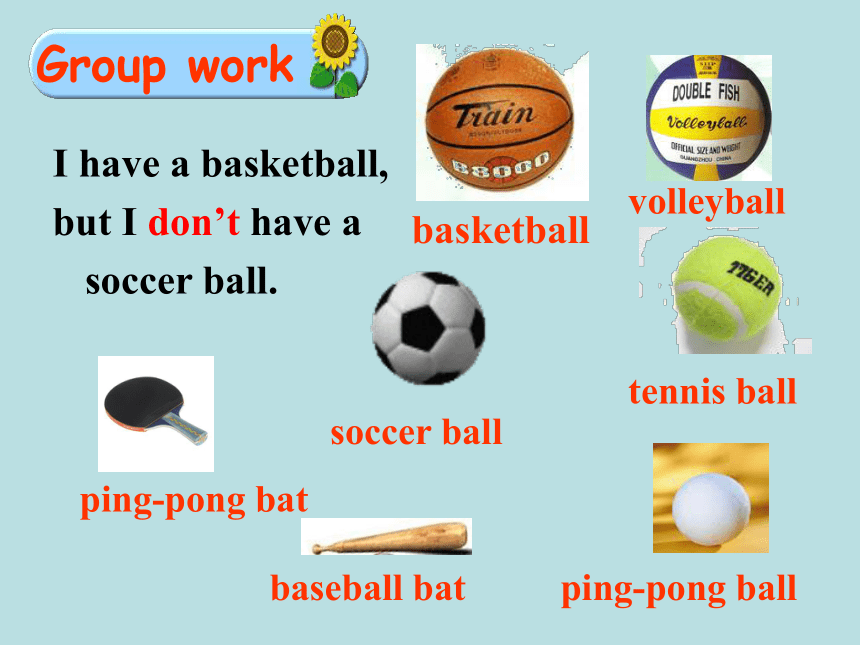
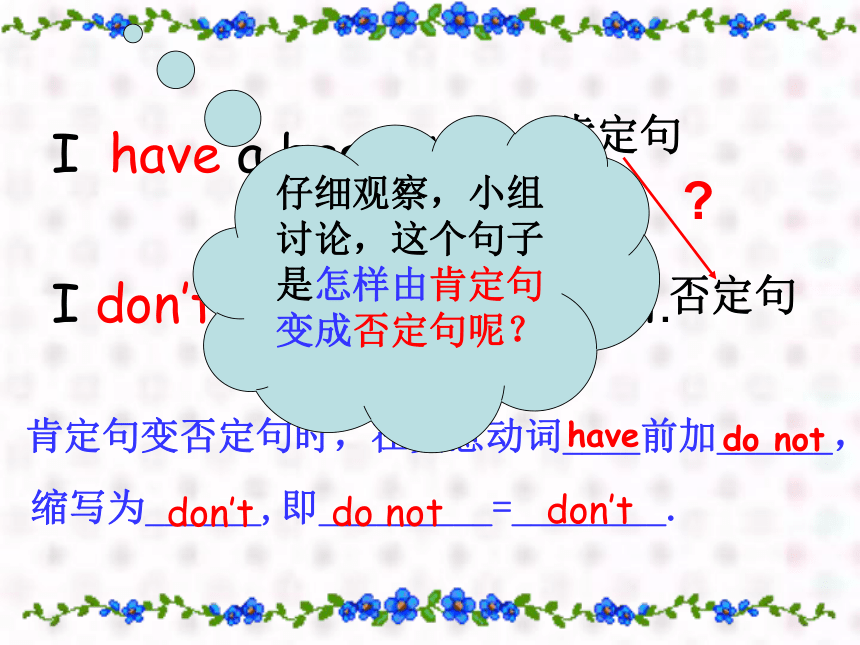
文档简介
(共55张PPT)
Unit 5
Section A 1
1a-1c
1. To learn the sports words
tennis ball; ping-pong bat; ping-pong ball; soccer ball; volleyball; basketball; baseball; baseball bat
2. To talk about ownership
A: Do you/they have ...
Does he/she have…
B: Yes, I/they do. Yes, he/she does.
No, I/they don’t. No, he/she doesn’t.
— What’s that
— It’s a __________.
— Spell it, please
— ______________
_________
basketball
B-A-S-K-E-T-B-A-L-L
soccer ball
volleyball
tennis ball
ping-pong ball
baseball bat
ping-pong bat
Presentation
bat VS racket
baseball bat
ping-pong bat
tennis racket
badminton racket
basketball
soccer ball
tennis ball
ping-pong ball
Can you read Let’s hit(快速正确的读出单词)
baseball
baseball bat
volleyball
ping-pong bat
1. tennis ball __
2. ping-pong bat
__
3. soccer ball __
4. volleyball __
5. basketball __
6. baseball bat __
a
f
c
e
d
b
1a
Match the words with the things in the picture.
ping-pong bat
soccer ball
volleyball
ping-pong ball
1b Listen and circle the words you hear. 听录音,圈出所听到的单词。
听力原文
你有乒乓球拍吗?
你有乒乓球吗?
是的,我有。
不,我没有。
have意为“有,拥有”。
I have a basketball.
tennis ball
×
But I don’t have a tennis ball.
basketball
√
Group work
I have a basketball,
but I don’t have a soccer ball.
basketball
soccer ball
volleyball
tennis ball
ping-pong ball
baseball bat
ping-pong bat
I a basketball.
I a basketball.
肯定句
否定句
have
don’t have
肯定句变否定句时,在实意动词____前加______,
缩写为______,即_________=________.
have
do not
don’t
do not
don’t
仔细观察,小组讨论,这个句子是怎样由肯定句变成否定句呢?
Yes, I do. I have a basketball.
Do you have a basketball
√
basketball
I have a basketball.
/du:/
No, I don’t.
I don’t have a tennis ball.
Do you have a tennis ball
tennis ball
×
Yes, I do.
I have a soccer ball.
Do you have
a soccer ball
√
soccer ball
No, I don’t.
I don’t have a ping-pong bat.
Do you have a ping-pong bat
ping-pong bat
×
Yes, I_______.
I ______ a baseball bat.
Do you have
a baseball bat
√
baseball bat
do
have
I a basketball.
you have a basketball
Yes,
I do.
No,
I don’t.
(do not = don’t)
肯定句
一般疑问句
Do
have
肯定句变成一般疑问句时,要借助于助动词________,
放在句首;第_____人称变第_____人称;_____号
变____ 号;语调用_________。
do
一
二
句
问
升调
仔细观察,小组讨论,这个句子是怎样由肯定句变成一般疑问句呢?
/du:/
/h v/
/d nt/
Yes,
I do.肯定回答
No,
I don’t.
(do not = don’t)否定回答
I have a basketball.
肯定句
I don’t have a basketball.
否定句
Do you have a basketball
一般疑问句
A:Do you have a … ?
B:Yes, I do. I have a ….
Do you have a …
A: No, I don’t. I don’t have a ….
Pair work!
Summary
Sentences:
Do you have a ping-pong bat
Yes, I do.
Do you have a ping-pong ball
No, I don’t.
Vocabulary:
do
have
ball
basketball
soccer ball volleyball
tennis
ping-pong ball
ping-pong bat
baseball bat
(小结)
Homework
1. Review the new words and new sentences. (复习新单词和句型。)
2. Write a short article to talk about what sports equipments you have and what sports you like.
写一篇短文谈一谈你拥有的运动器材以及你所喜欢的体育运动。
Section A 2
2a-2c
Yes,
I do.肯定回答
No,
I don’t.
(do not = don’t)否定回答
I have a basketball.
肯定句
I don’t have a basketball.
否定句
Do you have a basketball
一般疑问句
I have a basketball.
√
He a basketball.
√
Jim
has
___
He has a soccer ball.
He
a soccer ball.
√
Jim
have
___
×
doesn’t
_____
Tom
[ d znt]
He a basketball.
He a basketball.
肯定句
否定句
has
doesn’t have
主语为三单时,have要变成三单形式 ,肯定句
变否定句时,借助于助动词 ______ ,在其后加 ______,
注意:变否定句时has要还原成动词原形____
即 ______ + ______
缩写为 ______,即_________=________.
not
doesn’t
does not
doesn’t
仔细观察,小组讨论,have 有什么变化呢?这个句子是怎样由肯定句变成否定句呢?
____
has
have
does
doesn’t
动词原形
______ he _______ a basketball
Yes, he _______ .
Does
have
does
He is Jim.
He a basketball.
has
___
He is Mike.
He ______ a volleyball.
____ he ____ a basketball
No, he _______.
has
Does
have
doesn’t
does not
They are Tom and his father.
They ______ a baseball bat.
______ they ______ a baseball
No, they _______.
have
Do
have
don’t
They don’t have a
baseball.
Does he have a soccer ball
Yes, he does. He has a soccer ball.
Does he have a tennis
No, he doesn’t. He doesn’t have a tennis.
He a basketball.
he a basketball
Yes,
he does.
No,
he doesn’t.
(does not = doesn’t)
肯定句
一般疑问句
Does
has
主语为三单,肯定句变成一般疑问句时,
要借助于助动词________,放在句首;实意动词has还原
成动词原形 。即
_____号变____ 号;语调用_________。
does
句
问
升调
仔细观察,小组讨论,has有什么变化?这个句子是怎样由肯定句变成一般疑问句呢?
_____
have
have
+ _________
_________
does
动词原形
Does he/she have a …
Yes, he/she does. He/She has a…
No, he/she doesn’t .He/She doesn’t have a…
…
Listen to the conversations and number the pictures [1-4].
1
2a
3
2
4
Listen again. Match the pictures in 2a with the balls.
2b
2
3
4
听力原文
*have意为“有,拥有”。
我们可以用have(第三人称单数:has)表示物品所属关系。
*have (has)的一般疑问句可以用来询问物品所属关系:
Do you/they have…
Does he/she have…
肯定回答:Yes, I/they do.
Yes, he/she does.
否定回答:No, I/they don’t.
No, he/she doesn’t.
第一人称
第二人称
第三人称
单数
复数
单数
单数
复数
复数
I
we
you
you
they, boys
…
he, she, it
…
do
does
Section A 3
2d
句型转换。
1. I have a basketball. (改为一般疑问句)
_______ you ________ a basketball
2. Tom has a volleyball. (改为一般疑问句)
_______ Tom ________ a volleyball
3.Do you have a tennis ball (作否定回答)
________ , I ___________ .
4.Does he have a soccer ball (作否定回答)
________ , he ___________ .
5.They have a basketball. (改为否定句)
They ________ _________ a basketball.
6.Lucy has a basetball. (改为否定句)
Lucy ________ _________ a baseball.
Do
have
Does
have
No
don’t
No
doesn’t
don’t
have
doesn’t
have
baseball on the chair
baseball bat in Helen’s bag
Helen's jacket Bill has it.
Now read the conversation and match the things with their right places.
咱们走吧!我们已经晚了!
那我们的球棒在哪儿?
等我去取。
注意:句型Let’s…可用来提出建议。意为“让我们……”。
Role-play
1. Do you have a ping-pong bat
have作动词,意为“有”,一般指某人拥有某物,侧重于所属关系。其第三人称单数形式是has。
常用句式为:某人 + have/has + 某物,表示“某人有某物”。
在一般现在时态中,当主语为第三人称单数形式时,用has的形式。
【练习】翻译下列句子。
1)我有一个好朋友。
I have a good friend.
2)她有一支新钢笔。
She has a new pen.
2. We’re late!
1) we是人称代词主格,意为“我们”,在句子中作主语。
e.g. We are good friends. (翻译)
我们是好朋友。
我们有一个新足球。(翻译)
We have a new soccer ball.
us“我们”, 是we的宾格形式,在句子中放在介词或动词后作宾语。
【辨析】we / us / our
we“我们”是人称代词主格形式,作句
子的主语。
us“我们”是人称代词宾格形式,作句
子的宾语。
our “我们的”是形容词性物主代词,
放在名词前。
2) late “迟到” 是个形容词,常用be
late的结构。
【练习】翻译下列句子
1) It’s never too late to stop smoking.
戒烟何时都不算晚。
2) She’s late for work every day.
她每天上班都迟到。
3. Let’s go!
以动词let开头的祈使句,表示向别人提建议,意思是“让……做……吧”。
基本结构为:let sb. do sth.,表示 “让某人做某事”,表示说话人的建议。其中sb.可由名词或代词宾格来充当,其后的动词一定要用动词原形。
e.g. Let ___________. 让我来做吧。
Let _____ guess. 让他猜一猜。
him
me do it
let’s是let us的缩写形式,意为“咱们一起做某事吧”,通常表示建议、请求或命令。
肯定回答:一般用“OK”,“All right”,“Yes, let’s …”;
否定回答:一般用“Sorry, I …” 。
e.g. — _________! 让我们走吧!
— OK. 好吧。
Let’s look at the blackboard. (翻译)
让我们看黑板。
Let’s go
Role-play the conversation.
Language focus
Let’s go! We’re late!
Where’s our baseball bat
Let me get it.
A: Do you have a soccer ball
B: Yes. I do.
A: Where is the soccer ball
B: It’s on the floor.
棒球球棒
迟到
在包里
打篮球
在椅子上
让我们走吧。
让我去拿它吧。
让我们玩吧。
听起来……
baseball bat
be late
in the bag
play basketball
on the chair
Let's go.
Let me get it.
Let's play.
That sounds ...
—Does he / she have ...
—Yes, he / she does. / No, he / she doesn't.
——他 / 她有……吗?
——是的,他 / 她有。 / 不,他 / 她没有。
—Do you have ...
—Yes, I do. / No, I don't.
——你有……吗?
——是的,我有。 / 不,我没有。
Ⅰ. 根据句意及括号内所给单词的提示填空。
1. Hi, I'm Jason. I ________ (have) a sister.
2. Bob, here are two _________ (volleyball) for you.
3. Kate, are these your _________ (basketball)
have
volleyballs
basketballs
Unit 5
Section A 1
1a-1c
1. To learn the sports words
tennis ball; ping-pong bat; ping-pong ball; soccer ball; volleyball; basketball; baseball; baseball bat
2. To talk about ownership
A: Do you/they have ...
Does he/she have…
B: Yes, I/they do. Yes, he/she does.
No, I/they don’t. No, he/she doesn’t.
— What’s that
— It’s a __________.
— Spell it, please
— ______________
_________
basketball
B-A-S-K-E-T-B-A-L-L
soccer ball
volleyball
tennis ball
ping-pong ball
baseball bat
ping-pong bat
Presentation
bat VS racket
baseball bat
ping-pong bat
tennis racket
badminton racket
basketball
soccer ball
tennis ball
ping-pong ball
Can you read Let’s hit(快速正确的读出单词)
baseball
baseball bat
volleyball
ping-pong bat
1. tennis ball __
2. ping-pong bat
__
3. soccer ball __
4. volleyball __
5. basketball __
6. baseball bat __
a
f
c
e
d
b
1a
Match the words with the things in the picture.
ping-pong bat
soccer ball
volleyball
ping-pong ball
1b Listen and circle the words you hear. 听录音,圈出所听到的单词。
听力原文
你有乒乓球拍吗?
你有乒乓球吗?
是的,我有。
不,我没有。
have意为“有,拥有”。
I have a basketball.
tennis ball
×
But I don’t have a tennis ball.
basketball
√
Group work
I have a basketball,
but I don’t have a soccer ball.
basketball
soccer ball
volleyball
tennis ball
ping-pong ball
baseball bat
ping-pong bat
I a basketball.
I a basketball.
肯定句
否定句
have
don’t have
肯定句变否定句时,在实意动词____前加______,
缩写为______,即_________=________.
have
do not
don’t
do not
don’t
仔细观察,小组讨论,这个句子是怎样由肯定句变成否定句呢?
Yes, I do. I have a basketball.
Do you have a basketball
√
basketball
I have a basketball.
/du:/
No, I don’t.
I don’t have a tennis ball.
Do you have a tennis ball
tennis ball
×
Yes, I do.
I have a soccer ball.
Do you have
a soccer ball
√
soccer ball
No, I don’t.
I don’t have a ping-pong bat.
Do you have a ping-pong bat
ping-pong bat
×
Yes, I_______.
I ______ a baseball bat.
Do you have
a baseball bat
√
baseball bat
do
have
I a basketball.
you have a basketball
Yes,
I do.
No,
I don’t.
(do not = don’t)
肯定句
一般疑问句
Do
have
肯定句变成一般疑问句时,要借助于助动词________,
放在句首;第_____人称变第_____人称;_____号
变____ 号;语调用_________。
do
一
二
句
问
升调
仔细观察,小组讨论,这个句子是怎样由肯定句变成一般疑问句呢?
/du:/
/h v/
/d nt/
Yes,
I do.肯定回答
No,
I don’t.
(do not = don’t)否定回答
I have a basketball.
肯定句
I don’t have a basketball.
否定句
Do you have a basketball
一般疑问句
A:Do you have a … ?
B:Yes, I do. I have a ….
Do you have a …
A: No, I don’t. I don’t have a ….
Pair work!
Summary
Sentences:
Do you have a ping-pong bat
Yes, I do.
Do you have a ping-pong ball
No, I don’t.
Vocabulary:
do
have
ball
basketball
soccer ball volleyball
tennis
ping-pong ball
ping-pong bat
baseball bat
(小结)
Homework
1. Review the new words and new sentences. (复习新单词和句型。)
2. Write a short article to talk about what sports equipments you have and what sports you like.
写一篇短文谈一谈你拥有的运动器材以及你所喜欢的体育运动。
Section A 2
2a-2c
Yes,
I do.肯定回答
No,
I don’t.
(do not = don’t)否定回答
I have a basketball.
肯定句
I don’t have a basketball.
否定句
Do you have a basketball
一般疑问句
I have a basketball.
√
He a basketball.
√
Jim
has
___
He has a soccer ball.
He
a soccer ball.
√
Jim
have
___
×
doesn’t
_____
Tom
[ d znt]
He a basketball.
He a basketball.
肯定句
否定句
has
doesn’t have
主语为三单时,have要变成三单形式 ,肯定句
变否定句时,借助于助动词 ______ ,在其后加 ______,
注意:变否定句时has要还原成动词原形____
即 ______ + ______
缩写为 ______,即_________=________.
not
doesn’t
does not
doesn’t
仔细观察,小组讨论,have 有什么变化呢?这个句子是怎样由肯定句变成否定句呢?
____
has
have
does
doesn’t
动词原形
______ he _______ a basketball
Yes, he _______ .
Does
have
does
He is Jim.
He a basketball.
has
___
He is Mike.
He ______ a volleyball.
____ he ____ a basketball
No, he _______.
has
Does
have
doesn’t
does not
They are Tom and his father.
They ______ a baseball bat.
______ they ______ a baseball
No, they _______.
have
Do
have
don’t
They don’t have a
baseball.
Does he have a soccer ball
Yes, he does. He has a soccer ball.
Does he have a tennis
No, he doesn’t. He doesn’t have a tennis.
He a basketball.
he a basketball
Yes,
he does.
No,
he doesn’t.
(does not = doesn’t)
肯定句
一般疑问句
Does
has
主语为三单,肯定句变成一般疑问句时,
要借助于助动词________,放在句首;实意动词has还原
成动词原形 。即
_____号变____ 号;语调用_________。
does
句
问
升调
仔细观察,小组讨论,has有什么变化?这个句子是怎样由肯定句变成一般疑问句呢?
_____
have
have
+ _________
_________
does
动词原形
Does he/she have a …
Yes, he/she does. He/She has a…
No, he/she doesn’t .He/She doesn’t have a…
…
Listen to the conversations and number the pictures [1-4].
1
2a
3
2
4
Listen again. Match the pictures in 2a with the balls.
2b
2
3
4
听力原文
*have意为“有,拥有”。
我们可以用have(第三人称单数:has)表示物品所属关系。
*have (has)的一般疑问句可以用来询问物品所属关系:
Do you/they have…
Does he/she have…
肯定回答:Yes, I/they do.
Yes, he/she does.
否定回答:No, I/they don’t.
No, he/she doesn’t.
第一人称
第二人称
第三人称
单数
复数
单数
单数
复数
复数
I
we
you
you
they, boys
…
he, she, it
…
do
does
Section A 3
2d
句型转换。
1. I have a basketball. (改为一般疑问句)
_______ you ________ a basketball
2. Tom has a volleyball. (改为一般疑问句)
_______ Tom ________ a volleyball
3.Do you have a tennis ball (作否定回答)
________ , I ___________ .
4.Does he have a soccer ball (作否定回答)
________ , he ___________ .
5.They have a basketball. (改为否定句)
They ________ _________ a basketball.
6.Lucy has a basetball. (改为否定句)
Lucy ________ _________ a baseball.
Do
have
Does
have
No
don’t
No
doesn’t
don’t
have
doesn’t
have
baseball on the chair
baseball bat in Helen’s bag
Helen's jacket Bill has it.
Now read the conversation and match the things with their right places.
咱们走吧!我们已经晚了!
那我们的球棒在哪儿?
等我去取。
注意:句型Let’s…可用来提出建议。意为“让我们……”。
Role-play
1. Do you have a ping-pong bat
have作动词,意为“有”,一般指某人拥有某物,侧重于所属关系。其第三人称单数形式是has。
常用句式为:某人 + have/has + 某物,表示“某人有某物”。
在一般现在时态中,当主语为第三人称单数形式时,用has的形式。
【练习】翻译下列句子。
1)我有一个好朋友。
I have a good friend.
2)她有一支新钢笔。
She has a new pen.
2. We’re late!
1) we是人称代词主格,意为“我们”,在句子中作主语。
e.g. We are good friends. (翻译)
我们是好朋友。
我们有一个新足球。(翻译)
We have a new soccer ball.
us“我们”, 是we的宾格形式,在句子中放在介词或动词后作宾语。
【辨析】we / us / our
we“我们”是人称代词主格形式,作句
子的主语。
us“我们”是人称代词宾格形式,作句
子的宾语。
our “我们的”是形容词性物主代词,
放在名词前。
2) late “迟到” 是个形容词,常用be
late的结构。
【练习】翻译下列句子
1) It’s never too late to stop smoking.
戒烟何时都不算晚。
2) She’s late for work every day.
她每天上班都迟到。
3. Let’s go!
以动词let开头的祈使句,表示向别人提建议,意思是“让……做……吧”。
基本结构为:let sb. do sth.,表示 “让某人做某事”,表示说话人的建议。其中sb.可由名词或代词宾格来充当,其后的动词一定要用动词原形。
e.g. Let ___________. 让我来做吧。
Let _____ guess. 让他猜一猜。
him
me do it
let’s是let us的缩写形式,意为“咱们一起做某事吧”,通常表示建议、请求或命令。
肯定回答:一般用“OK”,“All right”,“Yes, let’s …”;
否定回答:一般用“Sorry, I …” 。
e.g. — _________! 让我们走吧!
— OK. 好吧。
Let’s look at the blackboard. (翻译)
让我们看黑板。
Let’s go
Role-play the conversation.
Language focus
Let’s go! We’re late!
Where’s our baseball bat
Let me get it.
A: Do you have a soccer ball
B: Yes. I do.
A: Where is the soccer ball
B: It’s on the floor.
棒球球棒
迟到
在包里
打篮球
在椅子上
让我们走吧。
让我去拿它吧。
让我们玩吧。
听起来……
baseball bat
be late
in the bag
play basketball
on the chair
Let's go.
Let me get it.
Let's play.
That sounds ...
—Does he / she have ...
—Yes, he / she does. / No, he / she doesn't.
——他 / 她有……吗?
——是的,他 / 她有。 / 不,他 / 她没有。
—Do you have ...
—Yes, I do. / No, I don't.
——你有……吗?
——是的,我有。 / 不,我没有。
Ⅰ. 根据句意及括号内所给单词的提示填空。
1. Hi, I'm Jason. I ________ (have) a sister.
2. Bob, here are two _________ (volleyball) for you.
3. Kate, are these your _________ (basketball)
have
volleyballs
basketballs
同课章节目录
- starters 预备篇(2012秋审查)
- Unit 1 Good morning !
- Unit 2 What’s this in English?
- Unit 3 What color is it ?
- Unit 1 My name's Gina.
- Section A
- Section B
- Unit 2 This is my sister.
- Section A
- Section B
- Unit 3 Is this your pencil?
- Section A
- Section B
- Unit 4 Where's my schoolbag?
- Section A
- Section B
- Unit 5 Do you have a soccer ball?
- Section A
- Section B
- Unit 6 Do you like bananas?
- Section A
- Section B
- Unit 7 How much are these socks?
- Section A
- Section B
- Unit 8 When is your birthday?
- Section A
- Section B
- Unit 9 My favorite subject is science.
- Section A
- Section B
